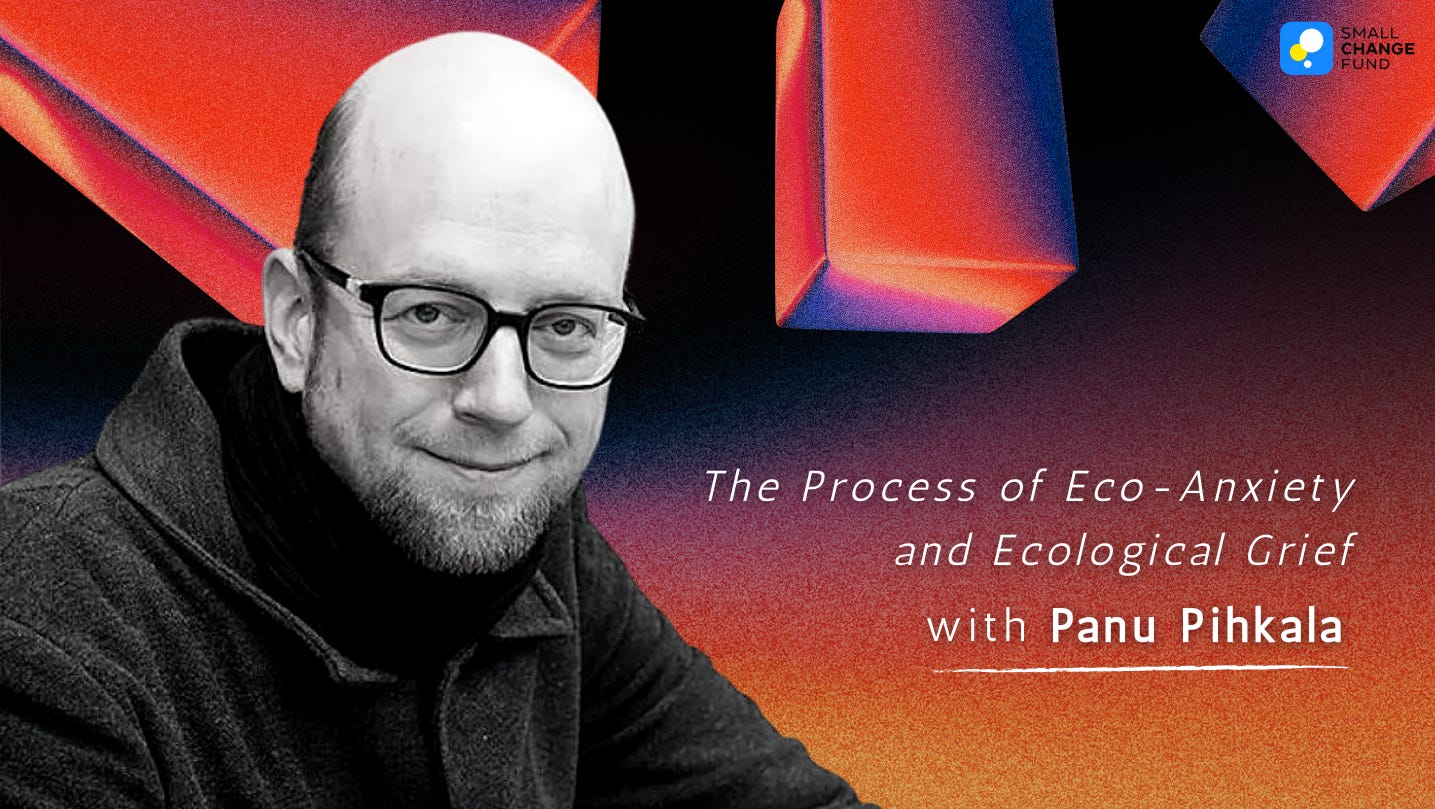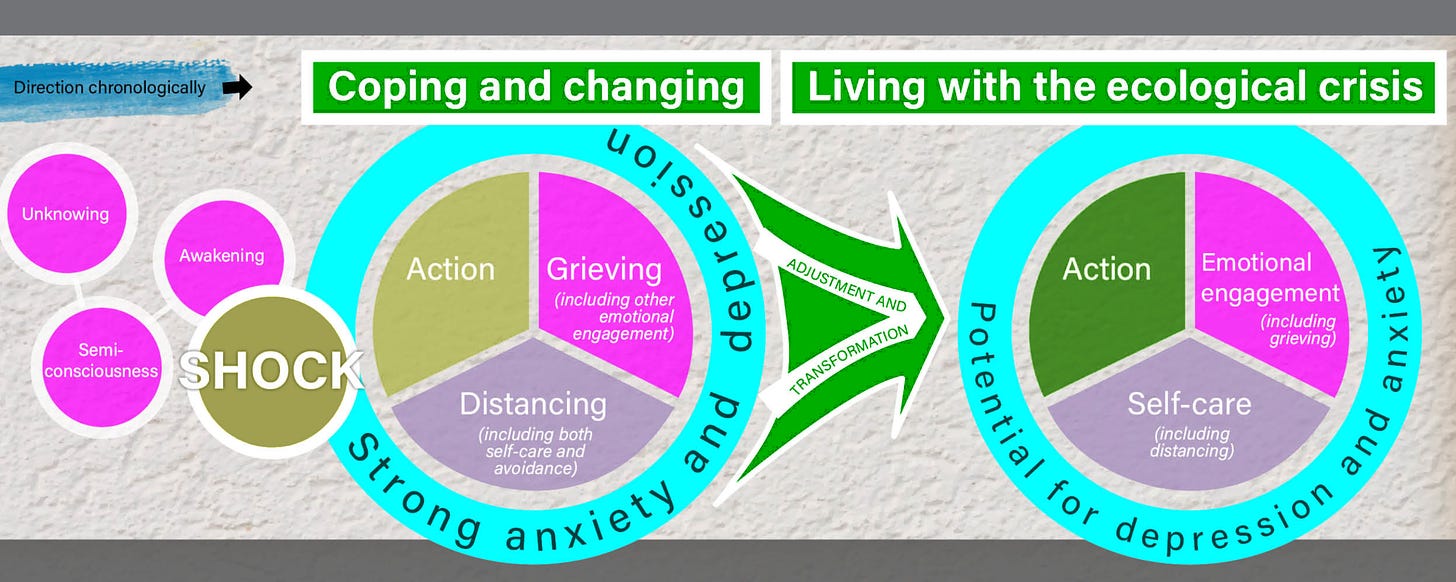How to take breaks from the climate crisis without living in denial
A conversation with Dr. Panu Pihkala
Hi there!
Welcome to Gen Dread, a newsletter about how the climate crisis is making us feel, why that’s happening, and what we can do about it. Subscribe now to find community, comfort, and practical coping strategies from experts all around the world.
In yesterday’s edition of Gen Dread, we showed you Dr. Panu Pihkala’s exciting new visual model for how a person moves mentally and emotionally from climate denial (whether soft or outright) into true acceptance of our alarming and difficult reality. If you missed that introduction to Dr. Pihkala’s work, you can find it right here.
We had some questions for Dr. Pihkala about how we can use this model in our daily lives, how it works, and, as people wake up to the severity of the climate crisis, how it might help us cultivate deeper connections and conversations with the people we love. In today’s edition of Gen Dread, we’re sharing Dr. Pihkala’s responses.
How to use this visual model
Why did you feel we needed this model?
DR. PANU PIHKALA: It was clear to me that there are various phases and possible paths in people’s experiences of eco-anxiety and grief, but in the literature there are not many mappings of these. And some existing mappings were a bit too linear, for example certain applications of the “Five Stages of Grief” model. I wanted to create a model which would be more nuanced and include dynamism.
How might a person use this model in everyday life?
I would recommend first just taking a look at the graphic figure and reading the names of the various phases and dimensions. It could be highly useful to make some notes:
What do I think of these words and dynamics? Do they sound familiar to me?
A second major recommendation would be to focus on the Coping and Changing part with its three dimensions and the background area of stronger anxiety and/or depression. A major point in the model is that all three dimensions are needed, at least to a certain extent, for healthy coping and transformation. People could reflect on their possible involvement in the three dimensions:
What’s my relationship with Action?
Am I actually letting some feelings of grief out, or am I trying either to avoid them or to keep them inside?
What ways of grieving could be possible for me, and what have been constructive for me in the past?
The third dimension of Distancing will be highly important. Issues to self-reflect on or to talk with others about in a safe settings include:
What’s my relationship with Distancing, both as self-care and avoidance?
What are my ways to replenish resources amidst the socio-ecological crises of our time?
Do I allow myself or others to take breaks and even have fun, despite all the suffering?
Are there some situations where I simply run away psychologically or physically? How to balance distancing in a healthy way?
Helping others wake up to the climate crisis
What typically moves the average person from unknowing to awakening? What are the conditions that correlate with the awakening turning into shock or trauma? And, if I have someone in my life who isn't fully awake to the ecological crisis the same way I am, is there any way for me to help them move into awakening, or is this something they have to do in their own time?
Everything happens in a kind of matrix where numerous factors affect the dynamics of both waking up and of what happens after. Those include our personal histories and all our vulnerabilities and capabilities; the reactions of our families, friends and peer groups; social support of lack of it in our communities, workplaces or educational institutions; and the various things which are happening in our societies, in media and social media, and so on. As a result of various factors, a similar kind of deliverance of information can cause traumas in some people and not in others.
Some people wake up abruptly, for example after seeing a piece of news or a documentary which “nails it”, and some people wake up slowly. In the best cases, there is both social support and gradual build-up to becoming awakened. It is terrible if people just crash the information on others. That strengthens the shocks and traumas. People can be gradually led into a deepening knowledge of how bad the ecological situation is.
Basically, as the psychosocial scholars such as Ro Randall and Renée Lertzman have been arguing for years, people need safety and support to dare to encounter potentially traumatic information. Especially in the case of adults, people can be invited to a deeper knowledge. The already-awakened person can give a message with their style of being that it is both possible and important to face reality. Having living examples of people who are “prospective survivors”, to use Robert Jay Lifton’s terminology, can encourage those in disavowal to approach the matter.
Caring, empathetic people should also avoid the temptation to try to carry everybody else. We are not responsible for the reactions of others to the ecological crisis: we are responsible for our own reactions and what they cause in others.
If I can help them move into awakening, is there any way to do this that avoids the intensity of shock and trauma?
We can’t know everything that encountering reality will cause, but still it’s socially and ecologically crucial that people approach reality and don’t live in “Planet La La”, to use psychoanalyst Sally Weintrobe’s term. But of course, if you intentionally lead someone to awakening, you have responsibility for how you do it. You can support the person up to the extent that you are able, you can provide tips for coping and even, for example, phone numbers or info about online groups which help. For people close to you, you can give the message that we’re in this together: we can support each other and uphold meaning in life together.
I wish to share an image and a fantasy which is directly related to this, even though it doesn’t solve all real-life problems. In one of my Finnish books, I wrote a fictional depiction of a community, a kind of tribe who lives in an era of ecological destruction. The community has developed a social and spiritual practice of protecting the kids from the traumatic knowledge of the severity of the crisis. The adults do not speak directly of it, although they do not lie, either, and they gradually build up the kids’ resilience. Then, at a certain age and developmental phase, there is an initiation ritual, a liminal journey to the wilderness with elders. In the protecting boundaries of the liminal journey, the resources of the youth are first strengthened and then in the midst of the journey the knowledge about the ecological crisis is engaged with. In other words, the community has learned how to apply the ancient wise practices of humanity into reaching “ecological adulthood” in a safer manner.
What to do when reading catastrophic news every day feels awful
You say that distancing plays an integral role in how we cope, change, and coexist with the ecological crisis. That can look like a decision to stay away from climate news on the weekends in the interest of self-care. But other forms of distancing can be destructive if they lead us to pretend ourselves away from reality and detach from our responsibility to do anything about the problem. Can you say more about the kind of distancing we need and why it is important?
What counts as healthy distancing is different for different people in different times and places, when evaluated ethically and psychologically. It is important to differentiate between various possible motives for distancing. If it is only due to a selfish interest to not be bothered, that’s condemnable. But many times people resort to significant distancing in an effort to protect their psyche and/or their social relations. And then social change and support is needed.
What I mean with healthy distancing is a variety of methods to replenish one’s energies and to keep functional. The pioneering climate communication and adaptation scholar Susanne Moser actually calls this “functional denial.” And in grief theory, experts have noticed that it is necessary for people to also take breaks from the intensity of the grieving process. The practical methods can be quite diverse, but often embodied activities together with trusted others are very helpful.
It’s all about balance and awareness. I think we need distancing on both a daily and weekly basis. An important part of this is to listen to what your bodymind is telling you. If you pay attention, it will tell you when something starts to be too much. Naturally the balancing act between determination to continue and the need to retreat will often be tricky, as both are needed.
What would you say to someone who feels they can't consume any climate news at all because it's so anxiety-provoking and terrible for their mental health?
One important thing is talking to yourself – not necessarily out loud! – and framing key issues. Be appreciative and gentle: appreciate that you care about the world so much that it causes you distress. There’s a strength and a virtue at the core of this difficulty that you have. You’ve not failed, you’re just finding it difficult because you care.
I would recommend making a commitment and at the same time recognizing limits and difficulties. For example: “I want to be able to stay in touch with what’s happening in the world” and “I commit myself to searching for such a balance in my life that I could both keep myself intact and gain enough news of what is going on.” When you express an aim like that, you engage on a path which winds towards it.
In practice, what has been helpful for many people is choosing the right forms of media and being careful about the rhythm. Personally, I pick a time of the day when I’m generally feeling strong, and definitely not the first thing in the morning. Sometimes I consult only text-based news, so that imagery or sound does not make the psychological impact worse. I know that some people have asked a trusted person, who is able to handle the news, to report the most important things in a safe manner regularly.
Retreating totally from following the news seems to be a growing issue and in the long run it is a major problem. I see it as an aspect of the process of ecological grief and anxiety. Ecological grief on a deep level is a kind of world-grief: it’s related to our attachments with the world. I think we need to support each other in reworking our affective bonds with the world, instead of letting those bonds break and retreating to a more individualized mode of life. Hopefully the news business would also refrain from both denial and catastrophizing, and from partisan media.
As always, you can share your thoughts with me and reach the Gen Dread community by commenting on this article or replying to this email. You can also follow me on Twitter and Instagram. I am not able to respond to every message, but I read them all and reply when I can.
‘Til next time!







First ? to ask...How much does this person charge?? from Trevor in New Zealand.
Here is an ESG quiz to make sure you are adhering to the climate religion, I mean science: https://yuribezmenov.substack.com/p/how-to-raise-your-esg-score